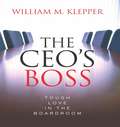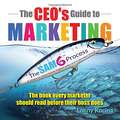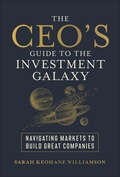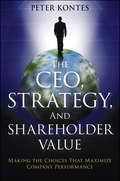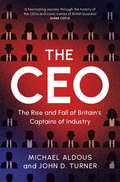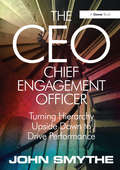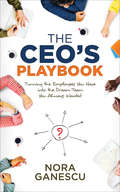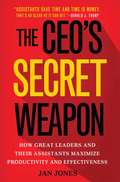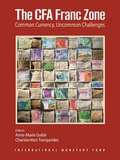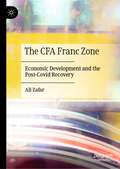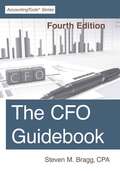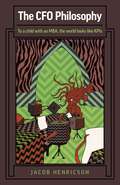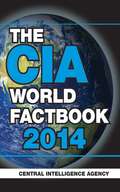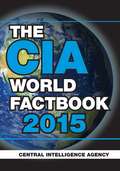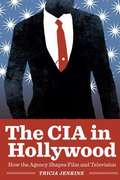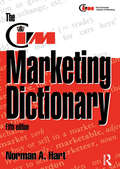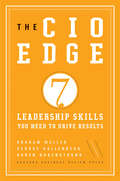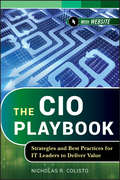- Table View
- List View
The CEO's Boss: Tough Love in the Boardroom (Columbia Business School Publishing)
by William KlepperIn order to avoid another Enron, WorldCom, or Tyco, company directors have assumed a bold and independent role in the boardroom, monitoring the actions and day-to-day operations of the CEO. This dramatic shift has created a new dynamic, one that requires careful negotiation from both parties to get the job done. Giving directors, executives, investors, and stakeholders the tools to make this relationship work, William M. Klepper describes the best techniques for building a productive partnership and establishing a plan of action for a variety of businesses and settings.Klepper, an executive educator, has worked with AT&T, Bausch & Lomb, Johnson & Johnson, Sony, Sun Microsystems, and a host of other corporations. He knows what makes a healthy partnership between a board and its CEO and the consequences of a bad fit. In this book, he details the eight practices of successful executives, such as facilitating innovation, motivating change, and developing leadership skills, and he explains what directors need to evaluate, such as working style, social behavior, and the handling of stress, before they commit to hiring a CEO. The most critical element is the social contract, in which directors and their CEOs agree to be transparent, continually reassess their company's risk, maintain core company values, and make a commitment to their stakeholders. These include employees, shareholders, customers, and the community. In this essential volume, Klepper encourages directors to embrace their independence, and he teaches executives to value tough love.
The CEO's Guide to Marketing: The most practical marketing book you will ever read
by Lonny KocinaThe CEO's Guide to Marketing outlines a six-step process called Strategically Aimed Marketing, or SAM 6® for short. It will bring clarity to marketing like you've never experienced before. It's literally a step-by-step guide to more leads, higher sales and a stronger brand.
The CEO's Guide to the Investment Galaxy: Navigating Markets to Build Great Companies
by Sarah Keohane WilliamsonNavigate the investment community with confidence to build great companies The CEO's Guide to the Investment Galaxy by Sarah Keohane Williamson provides indispensable insights for business leaders navigating the landscape of the global investment community. Not all shareholders are created equal. Knowing who your shareholders and the other members of the investment community are—and what drives them—is key to your success. Whether you're stepping into a CEO role at an established company or spearheading a promising start-up, this guide demystifies the diverse members of the investment community you will encounter, from pension funds to private equity firms to proxy advisors, and provides practical advice to help attract the shareholders who can support you in building a great company. Williamson draws on her extensive research of and experience with the investment community to deliver actionable strategies for engaging with shareholders and insulating your company from short-term pressures. The book offers a roadmap to effective communication and capital raising, helping you succeed in today's complex business environment—and fortify you against future challenges. Inside the book: Gain insights into the personalities, motivations, and strategies of various investor types Learn effective communication tactics to manage investor expectations Explore practical approaches to aligning your business with long-term investment goals The CEO's Guide to the Investment Galaxy is written for CEOs, board members, business leaders, and entrepreneurs looking to deepen their understanding of the investor landscape to fuel long-term company performance. It's also invaluable for journalists, policymakers, investors, and students aiming to grasp the nuances of modern of corporate finance.
The CEO, Strategy, and Shareholder Value: Making the Choices That Maximize Company Performance
by Peter KontesA new look at delivering effective shareholder value from Peter Kontes, a true leader in the world of strategic management In The CEO, Strategy, and Shareholder Value, Peter Kontes, a true leader in the strategic management field, outlines the key to creating and growing shareholder value. The proper focus, contends Kontes, is in using quantitative measurements as guideposts on the path to success. The book first outlines the basics of the argument Kontes is making. He then briefly covers the five most important areas for business leaders, followed by a more detailed look at each of the focus areas. Finally, Kontes provides readers with a road map to implementing his suggestions. Presents an argument for a more holistic approach to delivering shareholder value Defines and then elaborates a new approach to strategic management Written by a true thought leader in the field, regularly featured in publications such as Fortune and BusinessWeek Never before have business leaders experienced the kind of tough decisions they are being forced to make as the economy undergoes incredibly rapid shifts. The common sense guide to successful leadership, The CEO, Strategy, and Shareholder Value delivers exactly the kind of solid, dynamic advice that will keep your organization moving on an upward path.
The CEO: The Rise and Fall of Britain's Captains of Industry
by John D. Turner Michael AldousThe CEOs of Britain's largest companies wield immense power, but we know very little about them. How did they get to the top? Why do they have so much power? Are they really worth that exorbitant salary? Michael Aldous and John Turner provide the answers by telling the story of the British CEO over the past century. From gentleman amateurs to professional managers, entrepreneurs, frauds, and fat cats, they reveal the characters who have made it to the top of the corporate ladder, how they got there, and what their rise tells us about British society. They show how the quality of their leadership influences productivity, innovation, economic development and, ultimately, Britain's place in the world. More recently, issues have arisen regarding high CEO pay, poor performance, and a lack of professionalisation and diversity. Are there lessons from history for those who would seek to reform Britain's flagging corporate economy?
The CEO: Turning Hierarchy Upside Down to Drive Performance
by John SmytheYou may be a senior executive wondering how to engage hundreds or thousands of employees in your vision, strategy or the transformation of the business; or a specialist in HR, communication and change, tasked with the challenge of 'aligning and mobilising' your people. In either case, you no longer want compliant people, you want individuals who will engage their creativity at work. For their part, engaged employees want a say in their work and in how the business changes. The Chief Engagement Officer explores a management philosophy which recognises the value of opening up decision making to the right groups to improve the quality of decisions and change, accelerate execution and broaden ownership. John Smythe asks what the concept of engagement means for employer and employee; tests whether and how it is different from internal communication and provides a practical framework for those who want to engage colleagues but need advice based on applied experience. The book includes a tapestry of reports from organisations who are engaging their employees to drive performance and change. The author demonstrates how powerful models, developed from his work at SmytheDorwardLambert, his time as an organisational fellow with McKinsey and Company, and his consultancy with Engage for Change, can be used to take this process forward in any organisation. The Chief Engagement Officer is a highly readable guide to the revolution that is needed in employee communication and organisational leadership from one of the most experienced and well-regarded experts on employee communication.
The CEO’s Playbook: Turning the Employees You Have into the Dream Team You Always Wanted
by Nora GanescuMany business leaders love their work and their company, but don’t know what else to do to get their employees to love it, too. Their employees may be good people; however, leaders who want their team to become brilliant together are facing roadblocks. In The CEO’s Playbook, Nora Ganescu shows businesses how to become that exciting and innovative workplace that creates one game-changing success after the other. She also understands the importance of key elements such as dedication, passion, and joy at work and teaches leaders how to instill these qualities within their employees. If running your company feels more like pushing a huge boulder up the mountain, then you are not alone. The CEO’s Playbook can help.
The CEO’s Secret Weapon: How Great Leaders and Their Assistants Maximize Productivity and Effectiveness
by Jan JonesMany executives don't take full advantage of the assistant who sits right outside their door. This book educates executives about all the ways in which they can streamline and improve the way they work with the help of a great assistant, while teaching them to identify great candidates and maximize the benefits of this special relationship.
The CFA Franc Zone Common Currency, Uncommon Challenges
by Anne-Marie Gulde Charalambos TsangaridesAbout one-third of countries covered by the IMF's African Department are members of the CFA franc zone. With most other countries moving away from fixed exchange rates, the issue of an adequate policy framework to ensure the sustainability of the CFA franc zone is clearly of interest to policymakers and academics. However, little academic research on the subject exists in the public domain. This book aims to fill this void, by bringing together work undertaken in the context of intensified regional surveillance, and highlighting the current challenges and the main policy requirements if the arrangements are to be carried forward. The book is based on empirical research by a broad group of IMF economists, with contributions from several outside experts. Fourteen African countries are members of the CFA franc zone. The long-standing link between the West and Central African CFA francs and the euro (and before that the French franc) has contributed to monetary stability in the region. Yet the CFA franc zone, like other fixed exchange rate regimes, must be mindful of sustainability and competitiveness. Diversity and relatively loose economic integration among member countries add to the challenges. In reviewing policy options for the zone, the authors of this volume suggest policies that would safeguard the benefits to member countries from the common currency, and at the same time promote more flexible economic systems to absorb shocks and increase the rewards stemming from regional integration.
The CFA Franc Zone: Economic Development and the Post-Covid Recovery
by Ali ZafarThis book provides an empirical analysis of economic and political structures impacting the CFA franc zone. Concise and practical chapters explore the history of the CFA franc zone, challenges to development, geopolitical issues, the importance of flexible exchanges rates, growth trends, and the impact of the Covid crisis. Policy reform is examined to detail economic approaches that could reduce poverty and increase the quality of life within the area. This book aims to present a macroeconomic and exchange rate framework to promote development and post-Covid recovery within the CFA franc zone. It will be of interest to students, researchers, and policymakers involved in African economics, the political economy, and development economics.
The CFO Guidebook
by Steven M. BraggThe CFO manages the financial structure and oversees the financial performance of an organization, so this is a critical and demanding management position. The CFO Guidebook provides the CFO with detailed advice regarding how to be most effective in every aspect of the job. <p><P>The book covers all parts of the CFO's traditional finance role, including budgeting, fundraising, investments, going public, investor relations, and share management. It goes on to address more recent additions to the job, such as strategic planning, risk management, the control environment, and information technology. Given its comprehensive coverage of the CFO position, The CFO Guidebook can serve as a reference manual for anyone wanting to become more effective in the position.
The CFO Philosophy: To a Child with an MBA, the World Looks Like KPIs
by Jacob HenricsonSince they got started in the 1920's, generations of managers have emerged from the business schools worldwide, slowly taking over organizations both in the public and in the private sector. They are armed with only two objectives: 1) define targets and 2) measure progress. "What gets measured gets done". And the rest of us are so caught up in the same thinking that we cannot even see that alternative ways of leading exist. This book is about the modern management that makes corporate life dreary and bureaucratic. In a time where we should be enjoying the fruits of centuries of marvelous technological advances and spending more time on the good things in life, our lives are consumed by bureaucracy like never before. Almost nobody likes that, but whose fault is it? Where does the modern management style come from, why do we have it and why does every effort to replace it end up with something that becomes more of the same?
The CFO as Analyst and Adviser
by Jeremy HopeSurveys show that most CFOs want to upgrade their role from accounting specialists to strategic or business partners. But few CFOs have actually made the change, primarily because they have neither the time nor the necessary capabilities within the current finance team. But for those who do make the change, the rewards are tangible. This chapter lays out a number of important steps that the CFO and the finance team need to take to position themselves as trusted and valued business partners within the organization. This chapter is excerpted from "Reinventing the CFO: How Financial Managers Can Transform Their Roles and Add Greater Value."
The CFO as Champion of Change
by Jeremy HopeExpectations around the role of the CFO have greatly intensified in recent years. The CFO is now expected to be business generalist, risk management expert, and all-knowing source of business intelligence; to provide instant replies to any question the CEO asks about business performance; and to meet these challenges with lower costs. This chapter looks at the origins of the increased pressure on CFOs and explains why it is necessary for CFOs to break out of dysfunctional systems and mental models to redefine their role and the role of finance organizations. This chapter is excerpted from "Reinventing the CFO: How Financial Managers Can Transform Their Roles and Add Greater Value."
The CFO as Freedom Fighter--Liberating the Organization from Information Overload
by Jeremy HopeFinance managers are trained to handle lots of raw data and make sense of it. But these data streams are overflowing, flooding the channels of information and knowledge, overwhelming managers' abilities to absorb and react to key messages, and forcing the sacrifice of precious thinking and planning time. The first task for the CFO is to liberate both finance and business managers from huge amounts of detail and the proliferation of complex systems that increase their workload and deny them time for reflection and analysis. This chapter examines the challenges involved. This chapter is excerpted from "Reinventing the CFO: How Financial Managers Can Transform Their Roles and Add Greater Value."
The CFO as Regulator of Risk
by Jeremy HopeThe regulatory regime that has emerged out of the age of corporate scandals and the Sarbanes-Oxley Act has forced CFOs to review their control systems and expand their knowledge and expertise dramatically. The CFO is now expected to be the chief compliance and chief risk officer rolled into one. How can you improve performance in this environment? This chapter shows how the CFO can set high performance and ethical standards, abandon the worst aspects of the fixed performance contract, and ensure transparency and accountability. This chapter is excerpted from "Reinventing the CFO: How Financial Managers Can Transform Their Roles and Add Greater Value."
The CFO as Warrior against Waste
by Jeremy HopeSome CFOs give the impression that the war on waste has been won, but nothing could be further from the truth. Evidence suggests that huge amounts of work in every type of organization add no value for the customer. This chapter examines the lessons CFOs can learn from organizations like Toyota, Southwest Airlines, and Dell about identifying and eliminating unnecessary costs. This chapter is excerpted from "Reinventing the CFO: How Financial Managers Can Transform Their Roles and Add Greater Value."
The CFO as the Architect of Adaptive Management
by Jeremy HopeDespite a number of compelling reasons to move away from annual plans and budgets, many CFOs are reluctant to make the change. They fail to recognize that there are alternative (and less dysfunctional) ways of driving performance improvement and making managers accountable for performance. CFOs need to implement systems that provide managers at every level with the capability to make fast, well-informed decisions. They need to replace annual planning cycles with more regular business reviews that enable managers to see trends, patterns, and "breaks in the curve" long before the competition. This chapter serves as a guide. This chapter is excerpted from "Reinventing the CFO: How Financial Managers Can Transform Their Roles and Add Greater Value."
The CIA World Factbook 2014
by Central Intelligence AgencyFrom Afghanistan to Zimbabwe, The CIA World Factbook 2014 offers complete and up-to-date information on the world’s nations. This comprehensive guide is packed with detailed information on the politics, populations, military expenditures, and economics of 2014.For each country, The CIA World Factbook 2014 includes: Detailed maps with new geopolitical data Statistics on the population of each country, with details on literacy rates, HIV prevalence, and age structure New data on military expenditures and capabilities Information on each country’s climate and natural hazards Details on prominent political parties, and contact information for diplomatic consultation Facts on transportation and communication infrastructure And much more!Also included are appendixes with useful abbreviations, international environmental agreements, international organizations and groups, weight and measure conversions, and more. Originally intended for use by government officials, this is a must-have resource for students, travelers, journalists, and businesspeople with a desire to know more about their world.
The CIA World Factbook 2015
by Central Intelligence AgencyFrom Afghanistan to Zimbabwe, The CIA World Factbook 2015 offers complete and up-to-date information on the world’s nations. This comprehensive guide is packed with detailed information on the politics, populations, military expenditures, and economics of 2015.For each country, The CIA World Factbook 2015 includes:Detailed maps with new geopolitical dataStatistics on the population of each country, with details on literacy rates, HIV prevalence, and age structureNew data on military expenditures and capabilitiesInformation on each country’s climate and natural hazardsDetails on prominent political parties, and contact information for diplomatic consultationFacts on transportation and communication infrastructureAnd much more!Also included are appendixes with useful abbreviations, international environmental agreements, international organizations and groups, weight and measure conversions, and more. Originally intended for use by government officials, this is a must-have resource for students, travelers, journalists, and business people with a desire to know more about their world.
The CIA in Hollywood: How the Agency Shapes Film and Television
by Tricia JenkinsWhat’s your impression of the CIA? A bumbling agency that can’t protect its own spies? A rogue organization prone to covert operations and assassinations? Or a dedicated public service that advances the interests of the United States? Astute TV and movie viewers may have noticed that the CIA’s image in popular media has spanned this entire range, with a decided shift to more positive portrayals in recent years. But what very few people know is that the Central Intelligence Agency has been actively engaged in shaping the content of film and television, especially since it established an entertainment industry liaison program in the mid-1990s. The CIA in Hollywood offers the first full-scale investigation of the relationship between the Agency and the film and television industries. Tricia Jenkins draws on numerous interviews with the CIA’s public affairs staff, operations officers, and historians, as well as with Hollywood technical consultants, producers, and screenwriters who have worked with the Agency, to uncover the nature of the CIA’s role in Hollywood. In particular, she delves into the Agency’s and its officers’ involvement in the production of The Agency, In the Company of Spies, Alias, The Recruit, The Sum of All Fears, Enemy of the State, Syriana, The Good Shepherd, and more. Her research reveals the significant influence that the CIA now wields in Hollywood and raises important and troubling questions about the ethics and legality of a government agency using popular media to manipulate its public image.
The CIM Marketing Dictionary
by Norman Hart John StapletonThe CIM Marketing Dictionary the 5th edition of the best-selling Dictionary of Marketing now contains over 3,000 terms. This greatly expanded dictionary spans the complete range of present-day marketing and associated terminology. Marketers will also find over 400 new entries covering the latest jargon they need to know in IT. In compiling this selection, the editor has drawn on his own extensive experience and sought the views of all the leading trade and professional associations. The CIM Marketing Dictionary will prove invaluable to all marketing professionals including marketing managers and directors, sales, marketing communications managers, specialists involved in purchasing, export and many other fields. Students of this subject will also find this book an essential reference point.
The CIO Edge
by George Hallenbeck Karen Rubenstrunk Graham WallerGreat CIOs consistently exceed key stakeholders' expectations and maximize the business value delivered through their company's technology. What's their secret?Sure, IT professionals need technological smarts, plus an understanding of their company's goals and the competitive landscape. But the best of them possess a far more potent ability: they forge good working relationships with everyone involved in an IT-enabled project, whether it's introducing new hardware or implementing a major business transformation.In The CIO Edge, the authors draw on Korn/Ferry International's extensive empirical data on leadership competencies as well as Gartner's research on IT trends and the CIO role. They prove that, for IT leaders, mastering seven essential skills yields big results.This new book lays out the people-to-people leadership competencies that the highest-performing CIOs have in common-including the ability to inspire others, connect with a diverse array of stakeholders, value others' ideas, and manifest caring in their relationships. The authors then explain how to cultivate each defining competency.Learn these skills, and you'll get more work done through others' enabling you to successfully execute more IT projects, generate better results for your company, and concentrate your efforts where they'll exert the most impact. The payoff? As the authors show, you'll work smarter, not harder-and get promoted far faster than your peers.
The CIO Paradox: Battling the Contradictions of IT Leadership
by Martha HellerRegardless of industry, most major companies are becoming technology companies. The successful management of information has become so critical to a company's goals that in many ways, now is the age of the CIO. Yet IT executives are besieged by a host of contradictions: bad technology can bring a company to its knees, but corporate boards rarely employ CIOs; CIOs must keep costs down at the very same time that they drive innovation. CIOs are focused on the future, while they are tethered by technology decisions made in the past. These contradictions form what Martha Heller calls The CIO Paradox, a set of conflicting forces that are deeply embedded in governance, staffing, executive expectations, and even corporate culture. Heller, who has spent more than 12 years working with the CIO community, offers guidance to CIOs on how to attack, reverse, or neutralize the paradoxical elements of the CIO role. Through interviews with a wide array of successful CIOs, The CIO Paradox helps readers level the playing field for IT success and get one step closer to bringing maximum value to their companies. The book addresses four vantage points for CIOs to consider as they move toward improvement: their particular Role, their Stakeholders, their Organization, and their particular Industry. When fully understood, these four aspects of IT leadership work in concert to comprise what Heller considers to be a winning formula for excellence.
The CIO Playbook: Strategies and Best Practices for IT Leaders to Deliver Value (Wiley CIO #585)
by Nicholas R. ColistoAs our economy shifts from recession to recovery, our current economic climate is ripe for transformation. CIOs are in a unique position to leverage technology in order to drive innovation and boost business growth. The CIO Playbook is the handy desk reference for CIOs, CEOs, CFOs, and up and coming leaders, revealing a dynamic seven-step framework (Partner – Organize – Innovate – Deliver – Support – Protect – Grow) that will guide you in making essential changes to your organization. The proven strategies, tools, and techniques in The CIO Playbook make it the ultimate "how-to" resource for creating a high-performance IT organization that delivers value-added products and services to employees, customers, and shareholders. Author Nicholas Colisto provides solutions to the issues that concern business leaders and IT practitioners, including: How to truly partner with business peers Delivering high-quality products and services that are embraced by your user community How to ensure your team is focused on the right innovations Measuring performance and running your department like a business Ways to attract, motivate, and retain a talented team working toward a common vision Managing risks to operate effectively and protect corporate reputation Featuring online templates for each of the seven steps described in the book, The CIO Playbook can help you transform your IT department from a mere order taker to a high-performance organization that delivers extraordinary business outcomes, despite this era of turbulent economic challenges.
